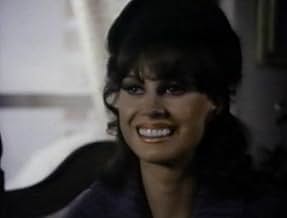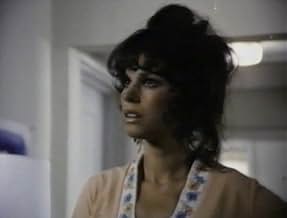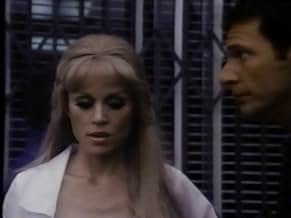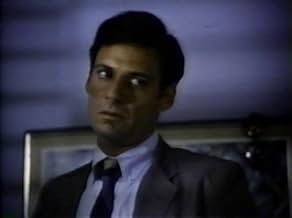अपनी भाषा में प्लॉट जोड़ेंInspired by the Alice Crimmins case in New York, Doris Winters (Tuesday Weld) is an attractive woman whose personal lifestyle is viewed by many as distasteful when she is accused of murderin... सभी पढ़ेंInspired by the Alice Crimmins case in New York, Doris Winters (Tuesday Weld) is an attractive woman whose personal lifestyle is viewed by many as distasteful when she is accused of murdering her young daughter.Inspired by the Alice Crimmins case in New York, Doris Winters (Tuesday Weld) is an attractive woman whose personal lifestyle is viewed by many as distasteful when she is accused of murdering her young daughter.
- 1 प्राइमटाइम एमी के लिए नामांकित
- कुल 1 नामांकन
David Patrick Wilson
- Detective Dick Tarcher
- (as David Wilson)
Lisa Blake Richards
- Mrs. Kazinsky
- (as Lisa Richards)
Robert Costanzo
- Norman Picker
- (as Robert Costanza)
कहानी
क्या आपको पता है
- ट्रिवियाThe film is loosely based on the real-life case of Alice Crimmins, a single mother in New York who was tried and convicted of murdering her two children in 1965, despite lack of evidence connecting her to the crime. Crimmins was convicted solely because of her reputation and appearance.
- कनेक्शनFeatured in The 30th Annual Primetime Emmy Awards (1978)
फीचर्ड रिव्यू
Tuesday Weld gives a moving performance. The cast includes able, veteran TV character actors. It explores serious themes. But this 1978 TV movie does too little with its rich but grim subject matter and largely obscure characters to be as entertaining or enlightening as it could.
Two young girls go mysteriously missing and turn up dead in ditches. They had lived with their mother. She is middle-aged, attractive, fiercely independent Doris Winters (Weld). After marrying young to a town drudge and years later "kicking him out," Winters, a lingerie model, donned platinum blonde wigs and "made it" with "more than 50 men" in town.
An informal conspiracy of prejudiced townspeople, a judgmental cop (Ron Leibman), political-hack, conviction-hungry police brass (M. Emmett Walsh) and prosecutor (Ron Rifkin), and a sensationalistic media closes in on Winters. Her casual male friends stand by her at first, but soon let her down. A drab neighbor woman belatedly claims to have seen a damaging scene the night the kids disappeared. The cops and DA bully a stubbornly indecisive medical examiner and a jealous, ruined Winters ex-lover (Alex Rocco) into giving damaging testimony. Like a Greek chorus, Leibman's partner keeps piping up to complain about weak evidence and how the investigation is mostly character assassination, focused only on Winters and ignoring other suspects. They include Winters' discarded but still-besotted husband who had been spying on her obsessively after they separated and had been seeking custody of their kids, as well as some stray area head-cases who had confessed.
At times, the movie is a suspenseful balancing act. There are traits to like and dislike in Winters. Weld convincingly conveys a kind of animal attraction. The movie shows that her lifestyle can make her popular during good times but vulnerable at a time of need. Her persecutors are not necessarily "evil." The crimes are horrible, she does not fit the image of a doting mother and arguably had a motive, there are some "discrepancies" to her story that may be suspicious, and the coroner's staff do not share their boss's indecisiveness about key medical evidence. The movie balances the themes of the demeaning harassment and possible railroading of a murder suspect and the vindication of innocent child victims. Today's concern is with too few moral values, but the movie suggests the damage that can be done -- at least to the integrity of the process and those caught up in it -- by crusading moral zeal (or resentments sometimes masquerading as such).
But the movie falls short by simply holding these conflicting themes in constant tension, without exploring them enough or resolving them at all. It plateaus at too low a level of drama, observation, and insight to make watching the increasingly slow-moving, repetitious, depressing material feel as if it has been worthwhile. In certain ways, it seems cold, clinical, mechanical, and lacking in depth (for example, the movie makes little or no attempt to humanize the victims or most of the many characters).
A key character is miscast and one-dimensional, wasting the talents of Ron Leibman. Aside from similarly stiff, sour, closed-mouth guest appearances as Rachel's father and Ross's nemesis on the TV show Friends, I have never seen Leibman add so little. He got rave reviews for a gritty, colorful supporting performance as a DA in the 1997 theatrical release Night Falls On Manhattan. In the early 1970s TV movie The Art of Crime, he chewed up the scenery as a Park Avenue gypsy art dealer turned amateur sleuth. Later in 1978, after Question of Guilt, he played hyper-kinetic ex-con-turned-lawyer Martin Kazinski in the intense TV show Kaz.
Here, except for an occasional gesture or verbal tic, Leibman is almost unrecognizable. As cop "Lou Kazinski," he is straight-jacketed in a lifeless, superficial, cardboard role. With unexplained, stiff, tight-wound bitterness, he stands around doing a teeth-clenched slow burn in countless reaction shots, mutters under his breath, and occasionally spits out hateful comments about Winters or rebuffs his cop partner. There is only one, brief scene at his home. He arrives at 3am from work, awakening his wife. He then picks a fight with her about the loud music playing down the street, calling the partygoers "animals." Most disappointing are his unrevealing interactions with Winters. Other cast members do competent jobs with unexceptional material.
The film has too little interesting to say about police or courtroom procedure. It gives almost no details about the crimes. It leaves up in the air whether Winters committed them. If she did not, then the detailed, damning testimony of her neighbor and ex-lover are out-and-out lies. It is easier to reconcile what happens, including her passionate but vague and perhaps deluded denials, with her being guilty. But the film ends, after a trial verdict, with Winters walking into a room alone, looking around, glancing at a photo of her two dead girls in her wallet (strangely, the only time the movie really humanizes the victims), and gazing toward the camera with slightly changing expressions, after which the screen freezes and the credits roll. I replayed this for any sign that the movie was trying to say something, but came up empty.
In reaction to "Hollywood" clichés, it has become fashionable (and a cliché in its own right) to praise a movie for not providing "answers." A movie may not take the trouble or the risk to resolve the plot, for fear that it might be seen as pat, contrived, or worst of all sins, a "neat" or "happy" ending. But it is a fault, not a virtue, when a movie fails to tell a meaningful or entertaining enough story. If it leaves the truth of the key event hanging, then it better have a lot to say otherwise. Rather than a strength here, the ending compounds weaknesses in the rest of the movie.
Two young girls go mysteriously missing and turn up dead in ditches. They had lived with their mother. She is middle-aged, attractive, fiercely independent Doris Winters (Weld). After marrying young to a town drudge and years later "kicking him out," Winters, a lingerie model, donned platinum blonde wigs and "made it" with "more than 50 men" in town.
An informal conspiracy of prejudiced townspeople, a judgmental cop (Ron Leibman), political-hack, conviction-hungry police brass (M. Emmett Walsh) and prosecutor (Ron Rifkin), and a sensationalistic media closes in on Winters. Her casual male friends stand by her at first, but soon let her down. A drab neighbor woman belatedly claims to have seen a damaging scene the night the kids disappeared. The cops and DA bully a stubbornly indecisive medical examiner and a jealous, ruined Winters ex-lover (Alex Rocco) into giving damaging testimony. Like a Greek chorus, Leibman's partner keeps piping up to complain about weak evidence and how the investigation is mostly character assassination, focused only on Winters and ignoring other suspects. They include Winters' discarded but still-besotted husband who had been spying on her obsessively after they separated and had been seeking custody of their kids, as well as some stray area head-cases who had confessed.
At times, the movie is a suspenseful balancing act. There are traits to like and dislike in Winters. Weld convincingly conveys a kind of animal attraction. The movie shows that her lifestyle can make her popular during good times but vulnerable at a time of need. Her persecutors are not necessarily "evil." The crimes are horrible, she does not fit the image of a doting mother and arguably had a motive, there are some "discrepancies" to her story that may be suspicious, and the coroner's staff do not share their boss's indecisiveness about key medical evidence. The movie balances the themes of the demeaning harassment and possible railroading of a murder suspect and the vindication of innocent child victims. Today's concern is with too few moral values, but the movie suggests the damage that can be done -- at least to the integrity of the process and those caught up in it -- by crusading moral zeal (or resentments sometimes masquerading as such).
But the movie falls short by simply holding these conflicting themes in constant tension, without exploring them enough or resolving them at all. It plateaus at too low a level of drama, observation, and insight to make watching the increasingly slow-moving, repetitious, depressing material feel as if it has been worthwhile. In certain ways, it seems cold, clinical, mechanical, and lacking in depth (for example, the movie makes little or no attempt to humanize the victims or most of the many characters).
A key character is miscast and one-dimensional, wasting the talents of Ron Leibman. Aside from similarly stiff, sour, closed-mouth guest appearances as Rachel's father and Ross's nemesis on the TV show Friends, I have never seen Leibman add so little. He got rave reviews for a gritty, colorful supporting performance as a DA in the 1997 theatrical release Night Falls On Manhattan. In the early 1970s TV movie The Art of Crime, he chewed up the scenery as a Park Avenue gypsy art dealer turned amateur sleuth. Later in 1978, after Question of Guilt, he played hyper-kinetic ex-con-turned-lawyer Martin Kazinski in the intense TV show Kaz.
Here, except for an occasional gesture or verbal tic, Leibman is almost unrecognizable. As cop "Lou Kazinski," he is straight-jacketed in a lifeless, superficial, cardboard role. With unexplained, stiff, tight-wound bitterness, he stands around doing a teeth-clenched slow burn in countless reaction shots, mutters under his breath, and occasionally spits out hateful comments about Winters or rebuffs his cop partner. There is only one, brief scene at his home. He arrives at 3am from work, awakening his wife. He then picks a fight with her about the loud music playing down the street, calling the partygoers "animals." Most disappointing are his unrevealing interactions with Winters. Other cast members do competent jobs with unexceptional material.
The film has too little interesting to say about police or courtroom procedure. It gives almost no details about the crimes. It leaves up in the air whether Winters committed them. If she did not, then the detailed, damning testimony of her neighbor and ex-lover are out-and-out lies. It is easier to reconcile what happens, including her passionate but vague and perhaps deluded denials, with her being guilty. But the film ends, after a trial verdict, with Winters walking into a room alone, looking around, glancing at a photo of her two dead girls in her wallet (strangely, the only time the movie really humanizes the victims), and gazing toward the camera with slightly changing expressions, after which the screen freezes and the credits roll. I replayed this for any sign that the movie was trying to say something, but came up empty.
In reaction to "Hollywood" clichés, it has become fashionable (and a cliché in its own right) to praise a movie for not providing "answers." A movie may not take the trouble or the risk to resolve the plot, for fear that it might be seen as pat, contrived, or worst of all sins, a "neat" or "happy" ending. But it is a fault, not a virtue, when a movie fails to tell a meaningful or entertaining enough story. If it leaves the truth of the key event hanging, then it better have a lot to say otherwise. Rather than a strength here, the ending compounds weaknesses in the rest of the movie.
- mysteriesfan
- 5 मार्च 2007
- परमालिंक
टॉप पसंद
रेटिंग देने के लिए साइन-इन करें और वैयक्तिकृत सुझावों के लिए वॉचलिस्ट करें
विवरण
- रिलीज़ की तारीख़
- कंट्री ऑफ़ ओरिजिन
- भाषा
- इस रूप में भी जाना जाता है
- Eingekreist
- फ़िल्माने की जगहें
- उत्पादन कंपनी
- IMDbPro पर और कंपनी क्रेडिट देखें
इस पेज में योगदान दें
किसी बदलाव का सुझाव दें या अनुपलब्ध कॉन्टेंट जोड़ें

टॉप गैप
What was the official certification given to A Question of Guilt (1978) in the United States?
जवाब



































